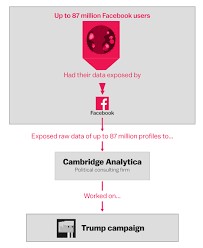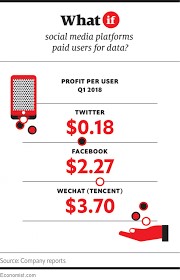Prunelle Dauty
This blog post was produced as part of the course “Social Media, Ideologies, and Ethics in the United States” at the University of Turku.
Social Media are everywhere nowadays, and whether we like it or not, we need to use them in our everyday life. They are slowly becoming indispensable, and not using them means being isolated from the rest of the world. The question is: is that something bad? Not necessarily. Social media are making our life so much easier, allowing us to communicate across the globe in real time. They are also giving a voice to people who have been oppressed for a long time, and who are finally able to speak up! But – because there is always a but – there is a flip side to those amazing possiblities that social media are offering us. That flip side is that in exchange for all of those advantages, we are giving them our personal information. They have access to our whole life through our phones, and they are using it to make money. I know, it sounds like a lame remake of George Orwell’s 1984, but wake up guys, this is the sad reality.
Social Media are everywhere nowadays, and whether we like it or not, we need to use them in our everyday life. They are slowly becoming indispensable, and not using them means being isolated from the rest of the world. The question is: is that something bad? Not necessarily. Social media are making our life so much easier, allowing us to communicate across the globe in real time. They are also giving a voice to people who have been oppressed for a long time, and who are finally able to speak up! But – because there is always a but – there is a flip side to those amazing possiblities that social media are offering us. That flip side is that in exchange for all of those advantages, we are giving them our personal information. They have access to our whole life through our phones, and they are using it to make money. I know, it sounds like a lame remake of George Orwell’s 1984, but wake up guys, this is the sad reality.

The Cambrige Analytica scandal is generally the first affair that comes to our minds when the misuse of data is mentioned. Indeed, a couple of years ago, it became known that during the U.S. 2016 presidential election campaign Cambridge Analytica, a company that worked with Donald Trump’s election team, harvested millions of Facebook profiles in order to be able to influence them and make them vote for Trump. Following the scandal, Facebook defended itself explaining that it had nothing to do with it. This brings up the question of data protection. How can we protect ourselves from those companies? It seems impossible without quitting social media. As it was demonstrated by CBC News in their very instructive video “Privacy and smartphone apps: What data your phone may be giving away” (you should definitely check it out if you haven’t watched it yet), protecting our personal data is complicated and except if we are ready to read the thousands of pages of users conditions, we are giving away all of our data without even benefiting from it.
Here is the interesting part: if we can’t stop using social media, and we can’t really stop them from using our data either, maybe we could try to benefit from it?

Andrew Yang, a potential candidate for the presidential election and former tech executive, mentioned this idea during the Democratic presidential debate at Otterbein University in Ohio on October 15, 2019. He explained that “right now, our data is worth more than oil” and that it would be only fair if the users “get a slice” of the money that their data is making. In addition, it would be a good way to gain back power against the large-scale companies. This idea is not new, and several federal lawmakers have already tried to implement it in different states, but as of yet without success.
In my opinion, this would be a solution to all of those data protection problems. It would be a way for the users to gain back the power that they have lost during these last years, and while failing to fully protect our data, it would at least offer us compensation and perhaps also the possibility to choose the information that we share. Indeed, being paid in exchange for sharing data would imply that the users’ permission and maybe even a signed contract is required, because as soon as money is involved, regulations are made.
Sources:
- « Facebook launches app that will pay users for their data | Technology | The Guardian ». Retrieved on December 5, 2019. https://www.theguardian.com/technology/2019/jun/11/facebook-user-data-app-privacy-study.
- « Social Media Companies Collect So Much Data Even They Can’t Remember All The Ways They Surveil Us ». Retrieved on December 5, 2019. https://www.forbes.com/sites/kalevleetaru/2018/10/25/social-media-companies-collect-so-much-data-even-they-cant-remember-all-the-ways-they-surveil-us/#5bf058a57d0b.
- « The Cambridge Analytica scandal changed the world – but it didn’t change Facebook | Technology | The Guardian ». Retrieved on December 5, 2019. https://www.theguardian.com/technology/2019/mar/17/the-cambridge-analytica-scandal-changed-the-world-but-it-didnt-change-facebook.
- « Andrew Yang: Facebook, Amazon, Google should pay for users’ data ». Retrieved on December 5, 2019. https://www.cnbc.com/2019/10/17/andrew-yang-facebook-amazon-google-should-pay-for-users-data.html.
